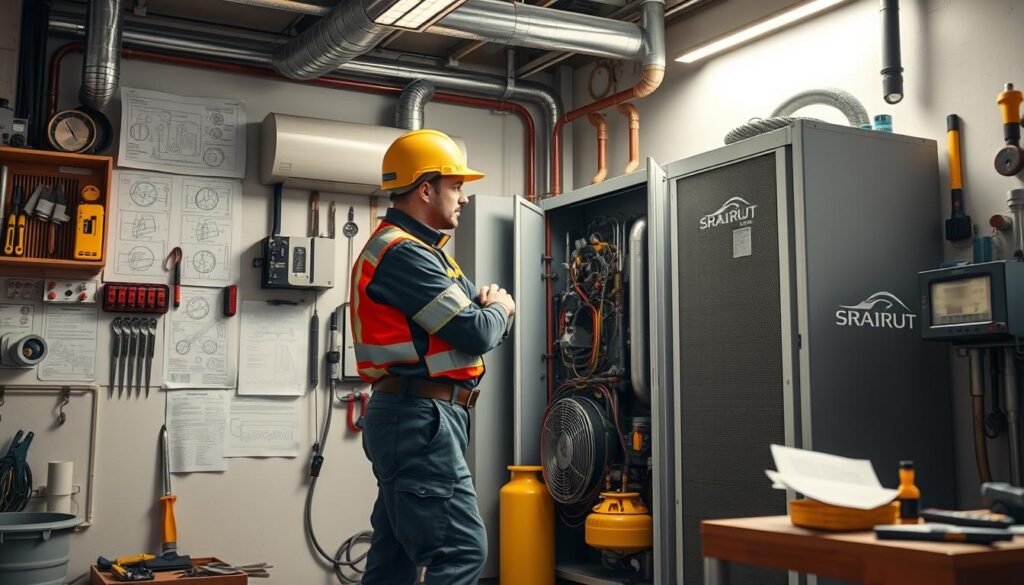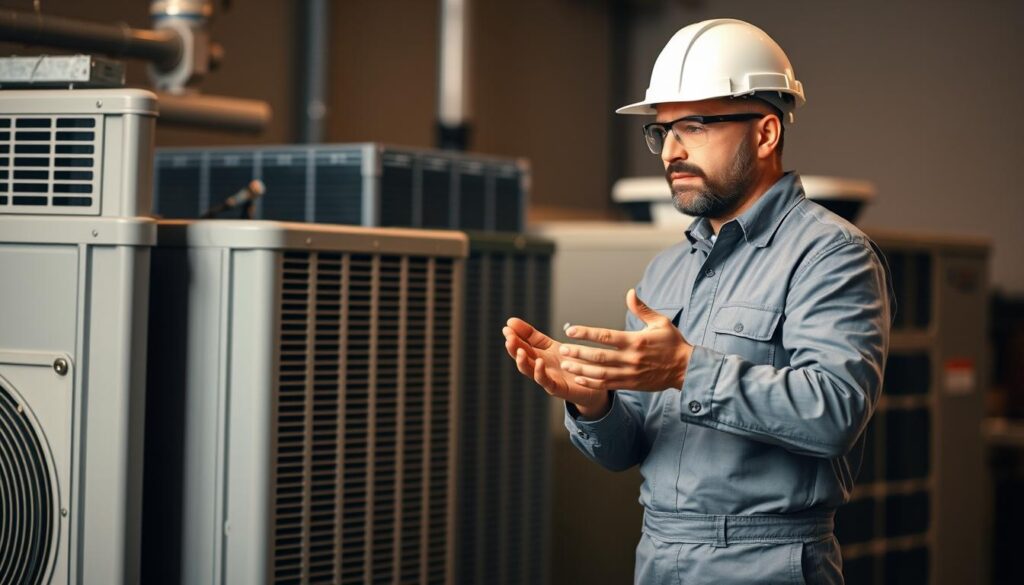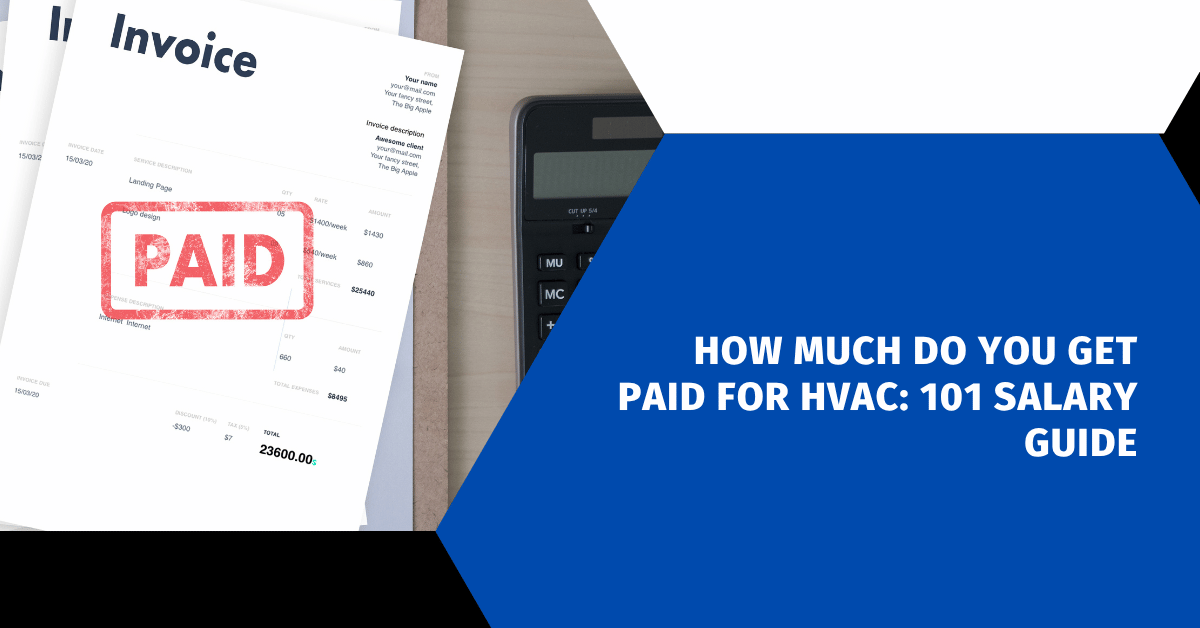Affiliate Disclosure
HVAC Guide Guys is a participant in the Amazon Services LLC Associates Program, an affiliate advertising program designed to provide a means for sites to earn advertising fees by advertising and linking to Amazon.
How Much Do You Get Paid for HVAC? Are you curious about the pay for HVAC technicians? The field of heating, ventilation, and air conditioning has great financial rewards. Knowing your salary range is the first step to a fulfilling career in this exciting industry.

The HVAC job isn’t just about technical skills. It’s also about making good money. HVAC technicians earn an average of $29.00 an hour. Their yearly salaries can be between $46,000 and $68,000. Your salary can change based on your experience, where you work, and your area of expertise.
If you’re thinking about trade school, looking to change careers, or want to move up in your field, knowing your HVAC pay is key. It helps you make smart choices about your career.
Key Takeaways
- Average HVAC technician salary ranges from $46,000 to $68,000 annually
- Hourly rates typically start around $29.00
- Salary varies based on experience, location, and specialization
- Growing industry with consistent demand for skilled professionals
- Career advancement opportunities can significantly increase earning
Table of Contents
Understanding HVAC Technician Career Overview
An HVAC technician is key to keeping places comfy indoors. They work in homes, offices, and factories. It’s not just about fixing air conditioners. It’s about making sure places are the right temperature, have good air, and use less energy.
The need for skilled HVAC workers is rising. This shows how important the field is. These experts help make spaces comfy and green.
Role and Responsibilities
HVAC techs handle big tasks with climate control systems:
- Installing new heating and cooling systems
- Doing regular checks and fixes
- Finding and fixing system problems
- Checking how well systems use energy
- Advising on system upgrades
Required Qualifications and Skills
To do well in HVAC, you need technical know-how and practical skills:
| Education | Technical Skills | Soft Skills |
|---|---|---|
| Technical diploma | Electrical systems | Problem-solving |
| Associate’s degree | Refrigeration knowledge | Customer communication |
| Professional certifications | Digital diagnostic tools | Time management |
Industry Growth Projections
The U.S. Bureau of Labor Statistics says HVAC tech jobs will grow by 9% from 2023 to 2033. This growth comes from more building projects, a focus on saving energy, and the need for better climate control.
Explore Our HVAC Shop
Looking for top-rated HVAC tools, parts, and accessories? Visit our shop and find the perfect solution for your needs.
Visit the ShopHow Much Do You Get Paid for HVAC: National Salary Trends
Understanding national salary trends is key when thinking about HVAC pay. The HVAC field offers good pay, but it changes based on several things.
The average yearly pay for HVAC techs is about $50,590. Pay can change a lot, from $31,000 for newbies to $80,000 for the most experienced.
“Your HVAC maintenance compensation depends on skill, experience, and market demand” – Industry Expert
Looking into the salary scene gives us some cool facts:
- Starting HVAC techs make between $31,000 – $40,000
- Those in the middle of their career earn $45,000 – $65,000
- Top-notch techs can make $70,000 – $80,000
Several things can affect how much you can earn:
| Factor | Salary Impact |
|---|---|
| Geographic Location | +/- 20% of base salary |
| Specialization | Up to 30% increase |
| Certification Level | 10-15% salary boost |
Keep in mind, these numbers are averages. Your pay can really vary based on your skills and where you live.
HVAC Salary Ranges by Experience Level
Your earnings in the HVAC field can grow as you move up in your career. Knowing what you can earn at each level helps you plan better. It also sets clear income goals for you.
HVAC technicians see their pay go up as they get more skilled. The amount you earn depends on your experience. There are big differences between starting out, being in the middle of your career, and being a senior.
Entry-Level Positions
At the beginning of your HVAC career, you can make about $52,300 a year. These early jobs usually include:
- Apprentice technician roles
- Basic installation and maintenance work
- Limited specialization
Mid-Career Earnings
As you get more experienced, your earnings will rise. Mid-career HVAC workers make around $63,500 a year. They are known for:
- Advanced technical knowledge
- Multiple certification credentials
- Specialized service capabilities
Senior Level Compensation
Top HVAC technicians can earn up to $74,500 a year. They have:
- Advanced technical mastery
- Management skills
- Complex problem-solving abilities
Invest in continuous learning and skill development to maximize your hvac repair income and career.
Explore Our HVAC Shop
Looking for top-rated HVAC tools, parts, and accessories? Visit our shop and find the perfect solution for your needs.
Visit the ShopTop-Paying States for HVAC Technicians
Location is key when it comes to HVAC technician salaries. Some states pay HVAC pros much more than the national average.
States like Alaska, Massachusetts, and New Jersey have the highest HVAC salaries. Alaska tops the list with salaries up to $75,660 a year. Massachusetts and New Jersey also offer great salaries, showing the demand for skilled HVAC techs.
- Alaska: Highest average annual salary ($75,660)
- Massachusetts: Exceptional compensation packages
- New Jersey: Competitive hvac technician salary ranges
What makes these salaries so high? It’s the complex climates, high living costs, and strong industrial bases.
- Complex climate conditions requiring advanced HVAC expertise
- Higher cost of living in metropolitan areas
- Strong industrial and commercial infrastructure
Your salary as an HVAC tech can really change based on where you work. Looking into state-specific jobs could help you earn more.
Pro tip: Consider moving or looking for jobs in high-paying states to increase your earnings.
Factors Affecting HVAC Technician Salaries
Understanding hvac contractor income involves looking at many factors. Your salary as an HVAC pro depends on several key things. These elements can greatly affect how much you earn.
Getting to know the world of hvac professional pay means seeing the small details that matter. These details shape how much you get paid in this changing field.
Geographic Location Impact
Your location is a big factor in your income. Salaries can change a lot depending on where you work:
- Urban areas usually pay more
- Places with harsh weather need more HVAC skills
- States with lots of building projects offer more chances
Education and Certification Influence
Your education and certifications can really up your earnings:
| Certification Level | Potential Salary Increase |
|---|---|
| EPA Section 608 Certification | 5-10% salary boost |
| NATE Certification | 10-15% salary increase |
| Advanced Specialized Certifications | 15-25% possible earnings growth |
Industry Sector Differences
Not all HVAC jobs pay the same. Different areas offer different pay levels:
- Commercial HVAC usually pays more than home work
- Industrial jobs need special skills and pay better
- Special areas like data center cooling get higher rates
“Your skills, location, and specialization are the three pillars of HVAC earning power.” – HVAC Industry Insider
By focusing on your skills and knowing these salary factors, you can boost your hvac contractor income. This can lead to a rewarding career in this vital field.
Explore Our HVAC Shop
Looking for top-rated HVAC tools, parts, and accessories? Visit our shop and find the perfect solution for your needs.
Visit the ShopCommercial vs. Residential HVAC Pay Scales

Looking into hvac installer wages shows big differences between commercial and residential HVAC. Commercial HVAC work pays more because it’s more complex and requires special skills.
Your pay can change a lot between these two areas. Commercial HVAC techs make more because they work on big systems in places like offices, hospitals, and factories.
- Commercial HVAC projects need advanced technical skills
- Residential work has simpler systems
- Knowing more about commercial HVAC can increase your earnings
Expect to earn 10-20% more in commercial HVAC than in residential. The big systems in commercial settings need more skill, which means better pay.
| HVAC Sector | Average Annual Salary | Skill Complexity |
|---|---|---|
| Residential HVAC | $52,000 – $65,000 | Standard |
| Commercial HVAC | $65,000 – $85,000 | Advanced |
Pro tip: Invest in continuing education and specialized certifications to maximize your commercial HVAC earning.
“The more complex the system, the higher the value of your expertise” – HVAC Industry Expert
Career Advancement and Salary Growth Opportunities
Your HVAC career doesn’t stop at entry-level positions. The industry offers many ways to increase your hvac professional pay. By focusing on career development, you can boost your earnings.
To move up in HVAC, you need dedication, skill, and a plan. Here are important steps for professional growth:
Management Positions
Going into management can greatly increase your earnings. HVAC supervisors and managers make up to $87,700 per year, more than technicians.
- Develop strong leadership skills
- Gain extensive technical expertise
- Demonstrate team management capabilities
- Pursue additional management training
Specialized Certifications
Getting advanced certifications can lead to better-paying jobs. These credentials show your expertise and can raise your hvac professional pay.
- EPA Section 608 Certification
- NATE (North American Technician Excellence) Certification
- Commercial Refrigeration Certification
- Energy Efficiency Specialist Credentials
Business Ownership
Starting your own HVAC business is a big step up. Business owners can earn as much as they want by using their technical skills and business smarts.
Successful HVAC business owners can make a lot more than traditional salaries.
Your earnings in HVAC depend on your willingness to learn and grow. The industry offers many chances for success.
Explore Our HVAC Shop
Looking for top-rated HVAC tools, parts, and accessories? Visit our shop and find the perfect solution for your needs.
Visit the ShopBenefits and Additional Compensation

When looking at hvac technician salary options, it’s key to see the whole picture. HVAC pros get more than just a salary. They also get benefits that boost their earnings.
Jobs in HVAC often come with extra perks that make the role more appealing:
- Health Insurance Coverage
- Dental and Vision Plans
- Retirement Savings Options
- Paid Time Off
- Performance Bonuses
Many companies offer great benefits to keep skilled HVAC techs on board. These perks can greatly increase your total pay.
| Benefit Type | Estimated Annual Value |
|---|---|
| Health Insurance | $6,000 – $12,000 |
| Retirement Contributions | $2,000 – $5,000 |
| Performance Bonuses | $1,500 – $4,000 |
| Tool Allowance | $500 – $1,500 |
Pro tip: When negotiating job offers, consider the entire compensation package, not just the base salary. These additional benefits can make a significant difference in your long-term financial security.
Getting specialized certifications or advanced training can lead to better pay in HVAC. Investing in your skills can open doors to higher-paying jobs and more benefits.
Conclusion
The HVAC industry is both exciting and rewarding for those who enjoy technical work and steady jobs. When you look into HVAC salaries, you’ll find a field with great growth and good pay. The industry is expected to grow by 9% from 2023 to 2033, opening up many opportunities for skilled workers in the U.S.
Your salary in HVAC depends on your experience, where you work, your specialty, and how much you learn. Getting certifications, keeping up with new tech, and getting more training can really boost your pay. Planning your career well can turn a starting job into a high-paying career.
Seeing HVAC as a career, not just a job, can lead to financial security and personal growth. The mix of technical skills, good pay, and steady demand makes HVAC a great choice. Your dedication to learning and doing well will help you succeed in this changing field.
Success in HVAC isn’t just about making money now. It’s about building a lasting, fulfilling career. By knowing about salary trends, improving your skills, and staying flexible, you can build a bright future in this vital and growing industry.

